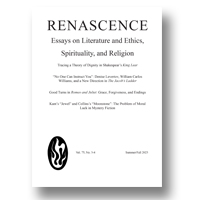|
1.
|
Renascence:
Volume >
75 >
Issue: 2
Nathan P. Devir
Reading The Exorcist in Benin:
How Discussing a Catholic Devotional Novel about Conflicting Approaches to Psychospiritual Healing in the United States Can Provide a Contextualized Understanding of Ecumenical West African Theology, Familial Values, Moral Ecclesiology, and Notions of Psychospiritual Wellness
abstract |
view |
rights & permissions
| cited by
This article investigates the reactions to and understandings of selected psychospiritual situations and themes from William Peter Blatty’s novel The Exorcist (1971) by Christian-professing mental health professionals and clergypersons in Benin. Using a variety of descriptive passages from the novel to stimulate discussion on potential similarities and differences between Global Northern and indigenously specific ontological frameworks, the study showcases selected Beninese perspectives on the causation of mental illness and/or supernatural affliction; highlights the diagnostic strategies employed by those tasked with healing psychospiritual trauma; and, most importantly, explores how Beninese theological responses to Blatty’s devotional message can shed light on the familial values and moral ecclesiology of a West African readership at ideological odds with the mores of the postmodern American audience for whom the novel was originally intended.
|
|
|
2.
|
Renascence:
Volume >
75 >
Issue: 2
Gary M. Bouchard
“If his compare with mine”:
Re-thinking Sacred Parody in Light of Robert Southwell’s Version of Edward Dyer’s “Fancy”
abstract |
view |
rights & permissions
| cited by
This essay interrogates the suitability of the term “sacred parody”, coined by Louis Martz in 1954, to describe the imitative poetic endeavors of Robert Southwell, SJ (1561–1595), and English poets like George Herbert who followed his example of converting secular Petrarchan poetry into sacred verses. The essay focuses its examination on Southwell’s most explicitly mimetic engagement with the established Elizabethan poetic paradigm, a poem by then renowned courtier poet, Edward Dyer (1540–1607). In his adaptation, Southwell converted Dyer’s poem into “Dyer’s Fancy Turned to a Sinner’s Complaint.” Just as the title announces, Southwell renders a re-writing of Dyer’s poem, transforming Dyer’s poem of Elizabethan idolatry into one of religious repentance. Remarkably, Southwell achieves this while leaving two-thirds of Dyer’s original poem intact. This essay examines these two poems alongside one another in order to consider what Southwell’s partial revision of Dyer’s poem suggests about the methods as well as the motives of his personal literary reformation project. Ultimately, it offers reasons for why the familiarly used term of “sacred parody” is an inappropriate descriptor of this Jesuit priest’s literary reformation enterprise.
|
|
|
3.
|
Renascence:
Volume >
75 >
Issue: 2
Joshua P. S. Kim
Beyond America and Back Again:
An Essay of Witness on Carolyn Forché’s Life and Work
abstract |
view |
rights & permissions
| cited by
This article offers a biography of the American poet, memoirist, and human rights activist Carolyn Forché. As an “essay of witness,” adapted from Forché’s term, the “poetry of witness,” it touches upon her childhood, discusses each of her poetry collections and her memoir, and concludes in the present, with Forché as the renowned “poet of witness” readers know today. Of particular emphasis in this essay is the international outlook, focus, and setting of Forché’s art and activism despite her identity as an American poet. This essay—by accentuating these “global” elements of her work—compels readers to rethink Forché’s career and to take an account of her life as embodying and bearing witness to an America whose history and destiny is richly intertwined with those of other states, in opposition to a vision of a nativist, isolationist, or nationalist America that has grown increasingly prominent in contemporary political discourse.
|
|
